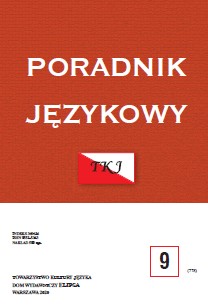OPERATORY ADNUMERATYWNE TYPU MARNY, DOBRY, BITY – PRÓBA CHARAKTERYSTYKI FORMALNO-SEMANTYCZNEJ
ADNUMERATIVE OPERATORS SUCH AS MARNY, DOBRY, BITY (MEASLY, GOOD, WHOLE): AN ATTEMPT AT A FORMAL AND SEMANTIC DESCRIPTION
Author(s): Katarzyna Doboszyńska-MarkiewiczContributor(s): Monika Czarnecka (Translator)
Subject(s): Theoretical Linguistics, Syntax, Lexis, Semantics, Western Slavic Languages, Philology
Published by: Dom Wydawniczy ELIPSA
Keywords: adjective; adnumerative operators; metatext;
Summary/Abstract: This paper presents the multitude and variety of expressions in the Polish language (e.g. góra, minimum, maks, raptem, bagatela, wszystkiego, po (at most, at least, max., only, merely, altogether)), which could be classified as adnumerative operators as defined by Maciej Grochowski. They include metapredictive adjectives such as dobry (milion) (a good (million)), ładne (100 kilometrów) (a good (100 kilometres)), bite (200 stron) (a whole (200 pages)), nędzne (200 złotych) (a measly (200 zloty)), which are characterised by connectivity with selected (standard and non-standard) units of measurement. The semantic and syntactic analysis of corpus examples shows that the discussed adjectives differ from their equivalents from the relevant language level in formal terms (non-predicativity, non-contrastivity, non-gradability, non-negativity) and semantic terms (communicating evaluations ‘to dużo’ (it’s much/many), ‘to mało’ (it’s little/few), indicating a precise or an approximate value, reinforcing assertion).
Journal: Poradnik Językowy
- Issue Year: 2020
- Issue No: 09
- Page Range: 59-74
- Page Count: 16
- Language: Polish
- Content File-PDF

